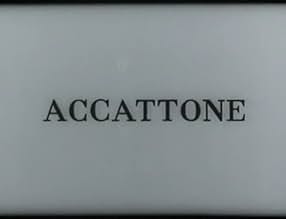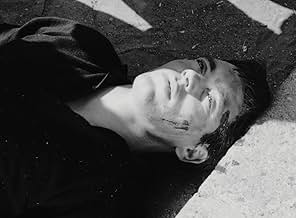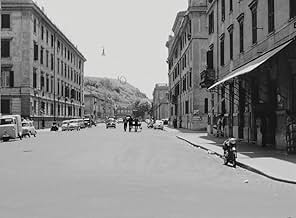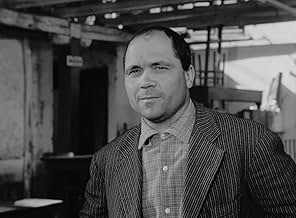A pimp with no other means to provide for himself finds his life spiraling out of control when his prostitute is sent to prison.A pimp with no other means to provide for himself finds his life spiraling out of control when his prostitute is sent to prison.A pimp with no other means to provide for himself finds his life spiraling out of control when his prostitute is sent to prison.
- Nominated for 1 BAFTA Award
- 3 wins & 4 nominations total
Featured reviews
Just to start with, Accattone was not filmed in Naples but in Rome. Someone might have brought to that understanding by some Neapolitans gangsters that appear at some point in the movie As for the "ruins" that scatter the landscape, they are mostly buildings that will soon replace the barracks such as the one in which Accattone lives, or the Acquedotto Felice, an ancient Roman aqueduct that runs close to Prenestina and Casilina, two Roman suburbs, that you can see in Mamma Roma as well. Franco Citti, the character of Accattone, perfectly embodies the roman lumpenproletariat of the time: idle, fatalistic and desperate. Pasolini met Franco's brother Sergio, a plasterer, hanging around Cinecittà in 1951. He introduced him to his brother Franco that became Pasolini's dialectical adviser for Accattone, Mamma Roma and his book "Ragazzi di vita"; his "living vocabulary" as he called him. Indeed, Pasolini interests for dialects and slangs (Roman is not really a dialect anymore but a slang) was not disappointed. The dialogues between the characters are full of fantasy: rude and in some way reminiscent of their peasant past. A must see if you're interested in Neorealism and in the "ways of the underworld lumpenproletariat". Someone connected this movie with Bunuel's "Los Olvidados". I definitely agree.
9cogs
Accattone is a relentless study of the suffering that accompanies poverty. Pasolini utilises the well worn techniques of the Italian neo-realist moment to represent the depressing and oppressive life of a pimp - Accattone (played by the astonishing Franco Citti) - in the slums of post-war Rome. His life is beleaguered by guilt and self-disgust; his occupation, which is ostensibly the exploitation of women, causes the titular character untold despair. Ultimately he is unable to rationalise his need to eat with the suffering he causes to the women who work for him; they are, after all, also his lovers. Yet, Pasolini is careful to maintain the humanity of his protagonist by representing his hopeless situation as equally a result of his own doings as that of the social environment. Pasolini's Accattone is a masterful debut which expertly calls into service the devices of the cinema to convey a depressing but also compassionate narrative. His style is equal parts poetry and melodrama; a tough combo for any director. Some moments of this film are as tragically lyrical as those to be found in a film by Robert Bresson or Roberto Rossellini. Accattone is a commendable combination of style and substance which will leave few viewers unaffected.
Pasolini's first film "Accatone" is exactly as one would expect a typical Pasolini film to be: wreathed in raw violence, and shot with a brilliant sense of poetic slash brutal realism, reminiscent of the neo-realism era, and perhaps, if not for sure, a semi-autobiographical portrait of life in the streets of Rome's peripheries. "Accatone" is, at its best, a chunk of life, which Pasolini managed to extract not as it initially was, but dramatically filtered through his own personal lyrical gaze. Gangs, prostitutes, lies and deceit lie in this film's core. A sense of irresponsible opportunism is seen in this film, almost no regrets for the past and no fears for the future. In fact, the movie's tragic hero, Vittorio Accatone, is a dark alter-ego of yet another favored Italian movie character, embodied only a year before by Marcello Mastroianni in "La Dolce Vita". Perhaps, in this case, Accatone was not a party animal journalist who sought ephemeral pleasure in social middle-class gatherings and women, but the spirit is, by itself, maintained astonishingly faithfully: Accatone is no longer a protagonist in Pasolini's movie, doomed to descend lower and lower in social class, losing both his dignity, his social acceptability and his profound "style", but a symbol, a metaphor for Pasolini's own political beliefs. Under this figure of a brute, behind the otherwise repelling image of a short dirty man with a sly smile and a peculiar walk, lies the failure of post war Italian government, a government which, according to this movie's subtext, strove so hopelessly to attain social and economical success for Rome's population, and somehow neglected or marginalized Rome's peripheries, causing people like Accatone and his girlfriends to result in prostitution and theft. A kind of pretension and make-belief well being which was also visible, at the time, in America. Yes, Accatone is the result of this American Dream's pastische.
Yes, it has some not so good scenes, bad lightning and it´s far from Passolini's beautiful aesthetic, but still, this movie is a masterpiece for what it represents. A brilliant start for a genius career, powerful and great story, and Pasolini's essence all over.
Accattone is a Neo-Realist examination of slovenly irresponsibility, tastelessness and self-pity - you know, the fun stuff. Its principal characters, a group of young upwardly-immobile Roman males, are almost uniformly repulsive, a lot of chest-baring half-savages whose idea of fun is luring a whore to a deserted spot and beating her to within an inch of her life. Its hero, Accattone, is played by one of the more unpleasant actors in the history of film, a fellow named Franco Citti, who manages to single-handedly set the entire nation of Italy back about two-hundred years. It is a film of almost relentless despair, depicting a Rome so desolate and squalid, so bereft of hope, that it seems almost medieval. In the hands of almost any director the movie would be unbearable - either unbearably sentimental or unbearably grim - but with Pasolini at the helm it is merely honest.
It isn't Pasolini's best film by a long way, but it may be the clearest example of what made the director so special - his ability to probe around the most revolting recesses of the human condition without seeming sensationalistic, exploitive or crass. It would be easy to go one of two directions with a character like Accattone, a lazy two-bit pimp with a son by a woman who wants nothing to do with him: the sentimental route or the grotesque. One could easily imagine De Sica, the soft-heart of Neo-Realism, turning Accattone into a sympathetic, misunderstood Everyman. And one could just as easily imagine Fellini, the most uptight director maybe in history, transforming the character into a universal symbol of societal decay. Pasolini, neither a sentimentalist nor a moralist, sees Accattone not as a sympathetic character nor as a symbol. The least judgmental director maybe ever, Pasolini conceives his characters entirely in terms of their outward behavior, and not in moral terms. He neither psycho-analyzes nor seeks to "understand" his characters. He simply presents them as they are, warts and all.
It was always the purpose of Neo-Realism to present life as it was lived, not life as it was imagined by screenwriters, directors and actors, and there are few more successful ventures in this regard than Accattone. The film's main triumph is in its atmosphere. The Roman days have never seemed so sun-bleached, so arid and oppressive; its nights never so mysterious, so full of inexpressible longing (not even in Henry James). The characters seem bound to this world in a palpable way, their faces (shot by expert cinematographer Tonino Delli Colli) mirroring the desolation, the hopelessness, the strangeness of their surroundings. The movie's physicality, as always with Pasolini, is striking. But pure physical vigor, pure atmosphere isn't enough. Where Pasolini comes up short is in assembling the parts of his film into something with real emotional breadth. His first feature shows him already on his way to being a master of the image, but also shows that he had a lot to learn about being a master of cinematic rhythm. The strange blend of primitivism and modernism is already there but the command is not. It's a film that works well in the moment but feels thin as a whole. It's a triumph of Neo-Realist technique but it only half-succeeds as a film.
Half-successful Pasolini is still better than the best most directors have to give. If you can portray a character as repulsive, as boorish and ego-maniacal as Accattone - a character with few if any redeeming features - for two hours without alienating your audience...well, chalk one up for the director who can do that. Especially one who manages the trick without resorting to sentimental contrivance or the kind of false significance people like Fellini always tried to drum up by filling their movies with obvious symbols, the sorts of things art-film zombies love because it gives them a chance to show their alleged smarts. Pasolini never flatters his audience but he never sneers at them either. He attempts to neither ingratiate himself with the public nor antagonize it in the manner of certain self-important avant-gardists. The best artists look for what interests them in a piece of material, not worrying whether their ideas, their approach, their style is accessible to the public at large, or critics, or scholars, or their grandmothers or anyone else. Accattone shows Pasolini on the road that would make him one of cinema's best directors - a road traveled by precisely one person, Pasolini himself.
It isn't Pasolini's best film by a long way, but it may be the clearest example of what made the director so special - his ability to probe around the most revolting recesses of the human condition without seeming sensationalistic, exploitive or crass. It would be easy to go one of two directions with a character like Accattone, a lazy two-bit pimp with a son by a woman who wants nothing to do with him: the sentimental route or the grotesque. One could easily imagine De Sica, the soft-heart of Neo-Realism, turning Accattone into a sympathetic, misunderstood Everyman. And one could just as easily imagine Fellini, the most uptight director maybe in history, transforming the character into a universal symbol of societal decay. Pasolini, neither a sentimentalist nor a moralist, sees Accattone not as a sympathetic character nor as a symbol. The least judgmental director maybe ever, Pasolini conceives his characters entirely in terms of their outward behavior, and not in moral terms. He neither psycho-analyzes nor seeks to "understand" his characters. He simply presents them as they are, warts and all.
It was always the purpose of Neo-Realism to present life as it was lived, not life as it was imagined by screenwriters, directors and actors, and there are few more successful ventures in this regard than Accattone. The film's main triumph is in its atmosphere. The Roman days have never seemed so sun-bleached, so arid and oppressive; its nights never so mysterious, so full of inexpressible longing (not even in Henry James). The characters seem bound to this world in a palpable way, their faces (shot by expert cinematographer Tonino Delli Colli) mirroring the desolation, the hopelessness, the strangeness of their surroundings. The movie's physicality, as always with Pasolini, is striking. But pure physical vigor, pure atmosphere isn't enough. Where Pasolini comes up short is in assembling the parts of his film into something with real emotional breadth. His first feature shows him already on his way to being a master of the image, but also shows that he had a lot to learn about being a master of cinematic rhythm. The strange blend of primitivism and modernism is already there but the command is not. It's a film that works well in the moment but feels thin as a whole. It's a triumph of Neo-Realist technique but it only half-succeeds as a film.
Half-successful Pasolini is still better than the best most directors have to give. If you can portray a character as repulsive, as boorish and ego-maniacal as Accattone - a character with few if any redeeming features - for two hours without alienating your audience...well, chalk one up for the director who can do that. Especially one who manages the trick without resorting to sentimental contrivance or the kind of false significance people like Fellini always tried to drum up by filling their movies with obvious symbols, the sorts of things art-film zombies love because it gives them a chance to show their alleged smarts. Pasolini never flatters his audience but he never sneers at them either. He attempts to neither ingratiate himself with the public nor antagonize it in the manner of certain self-important avant-gardists. The best artists look for what interests them in a piece of material, not worrying whether their ideas, their approach, their style is accessible to the public at large, or critics, or scholars, or their grandmothers or anyone else. Accattone shows Pasolini on the road that would make him one of cinema's best directors - a road traveled by precisely one person, Pasolini himself.
Storyline
Did you know
- TriviaThis was Bernardo Bertolucci's first work in movies. He was an assistant director.
- GoofsThe shadow of the camera is clearly visible on Accattone's shirt when he walks away towards the camera after the fight with Ascenza's Brother.
- Quotes
Vittorio "Accattone" Cataldi: Call me Accattone. There are lots of Vittorios but I'm the only Accattone.
- Alternate versionsThe VHS and DVD versions produced by Water Bearer Films are listed as running 116 minutes, suggesting that this print is four minutes shorter than the original release.
- ConnectionsEdited into Red Italy (1979)
- SoundtracksSt Matthew Passion
Composed by Johann Sebastian Bach
- How long is Accattone?Powered by Alexa
Details
- Release date
- Country of origin
- Languages
- Also known as
- The Scrounger
- Filming locations
- Ponte Testaccio, Rome, Lazio, Italy(motorbike accident)
- Production companies
- See more company credits at IMDbPro
Box office
- Gross worldwide
- $2,865
- Runtime1 hour 57 minutes
- Color
- Sound mix
- Aspect ratio
- 1.37 : 1
Contribute to this page
Suggest an edit or add missing content

































